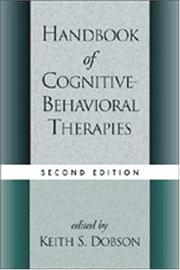| Listing 1 - 10 of 20 | << page >> |
Sort by
|

ISBN: 1572306017 Year: 2001 Publisher: New York, NY : Guilford Press,
Abstract | Keywords | Export | Availability | Bookmark
 Loading...
Loading...Choose an application
- Reference Manager
- EndNote
- RefWorks (Direct export to RefWorks)
Behavior therapy --- Cognitive therapy --- Klinische psychologie --- psychotherapie --- psychotherapie. --- Thérapie cognitive --- Thérapie comportementale
Film
ISBN: 9781433809897 1433809893 Year: 2011 Publisher: Washington, D.C.: American psychological association,
Abstract | Keywords | Export | Availability | Bookmark
 Loading...
Loading...Choose an application
- Reference Manager
- EndNote
- RefWorks (Direct export to RefWorks)
Cognitive–behavioral therapy (CBT), a system of treatment involving a focus on thinking and its influence on both behavior and feelings, is one of the dominant approaches to psychotherapy. CBT is based on a model of psychopathology that emphasizes the role of dysfunctional beliefs and situational cognitions and their influence on emotional and behavioral outcomes, which in turn reinforce negative beliefs and thought patterns. Cognitive–Behavioral Therapy Strategies illustrates multiple aspects of the CBT system of psychotherapy, including the setting conditions (e.g., the therapy relationship), parameters around the techniques, and the techniques themselves. Using selected vignettes from actual therapy sessions, Keith S. Dobson explores the key techniques used in cognitive–behavioral therapy, including developing a therapeutic alliance, case conceptualization, psychoeducation, assigning homework, and assessing automatic thoughts
Book
ISBN: 1462538584 9781462538584 Year: 2019 Publisher: New York: Guilford press,
Abstract | Keywords | Export | Availability | Bookmark
 Loading...
Loading...Choose an application
- Reference Manager
- EndNote
- RefWorks (Direct export to RefWorks)
Now revised and expanded with over 50% new material, this definitive clinical reference is the text of choice for graduate-level courses in evidence-based psychotherapy. Foremost authorities describe the conceptual and scientific foundations of cognitive-behavioral therapy (CBT) and provide a framework for assessment and case formulation. Major approaches are reviewed in detail, including emotion-centered problem-solving therapy, rational emotive behavior therapy, cognitive therapy, schema therapy, mindfulness- and acceptance-based interventions, and dialectical behavior therapy (DBT). Applications to specific populations are discussed, including children and adolescents, couples, culturally diverse clients, and more
Book
ISBN: 009173195X Year: 1988 Publisher: London : Hutchinson,
Abstract | Keywords | Export | Availability | Bookmark
 Loading...
Loading...Choose an application
- Reference Manager
- EndNote
- RefWorks (Direct export to RefWorks)
Book
ISBN: 1433841061 9781433841064 Year: 2024 Publisher: Washington, D. C. : American Psychological Association,
Abstract | Keywords | Export | Availability | Bookmark
 Loading...
Loading...Choose an application
- Reference Manager
- EndNote
- RefWorks (Direct export to RefWorks)
This book outlines integrative models and treatments for clinical depression based on a biopsychosocial approach.
Depression, Mental. --- Depression, Mental --- Treatment. --- Social aspects.
Book
ISBN: 143383670X 9781433836701 9781433841064 Year: 2024 Publisher: Washington, DC : American Psychological Association,
Abstract | Keywords | Export | Availability | Bookmark
 Loading...
Loading...Choose an application
- Reference Manager
- EndNote
- RefWorks (Direct export to RefWorks)
"This book offers integrative treatments for clinical depression based on the biopsychosocial model. Keith Dobson synthesizes decades of research and professional experience in this comprehensive guide that follows the therapy process from beginning to end. He starts with a theoretical overview of depression, including its associated features, risk and resiliency factors, and offers a comparative evaluation of various models of depression. Clinical chapters review the intake process, from the initial interview, to formulating an early case conceptualization and ensuring the client's involvement. Dobson then presents an organizational model to determine which issues to focus on in therapy, and the optimal interventions to address them. He also describes common strategies to target problematic behaviors and cognitions, develop problem-solving skills, and modify maladaptive thoughts and schemas. Guidelines for ending therapy and preventing relapse are also provided, as are considerations related to comorbid disorders, clients' relationships with significant others, and in-person vs. distance treatment. Recurring case examples with two hypothetical clients help to demonstrate the entire process for assessing, conceptualizing, and treating clinical depression"--
Depression, Mental --- Cognitive therapy --- Evidence-based psychotherapy --- Dépression --- Treatment. --- Thérapeutique.
Book
ISBN: 9781606234372 Year: 2010 Publisher: New York : Guilford Press,
Abstract | Keywords | Export | Availability | Bookmark
 Loading...
Loading...Choose an application
- Reference Manager
- EndNote
- RefWorks (Direct export to RefWorks)
Book
Year: 2012 Publisher: American Psychological Association
Abstract | Keywords | Export | Availability | Bookmark
 Loading...
Loading...Choose an application
- Reference Manager
- EndNote
- RefWorks (Direct export to RefWorks)
Digital
ISBN: 9780080560564 0080560563 1281790028 9781281790026 Year: 2008 Publisher: Burlington Elsevier
Abstract | Keywords | Export | Availability | Bookmark
 Loading...
Loading...Choose an application
- Reference Manager
- EndNote
- RefWorks (Direct export to RefWorks)
A complete reference on the many models of risk factors in depression.
Book
ISBN: 9780080450780 0080450784 9786611790028 1281790028 0080560563 9780080560564 9781281790026 Year: 2008 Publisher: Amsterdam ; Boston : Elsevier/Academic,
Abstract | Keywords | Export | Availability | Bookmark
 Loading...
Loading...Choose an application
- Reference Manager
- EndNote
- RefWorks (Direct export to RefWorks)
Depression is one of the most common mental health disorders, affecting 14% of all people at some point in their lifetime. Women are twice as likely to become depressed as men, but beyond gender there are a variety of risk factors that influence the prevalence and likelihood of experiencing depression. Risk Factors in Depression consolidates research findings on risk factors into one source, for ease of reference for both researchers and clinicians in practice. The book divides risk factors into biological, cognitive, and social risk factors. This provides researchers with th
Depression, Mental --- Etiology. --- Risk factors. --- Dejection --- Depression, Unipolar --- Depressive disorder --- Depressive psychoses --- Melancholia --- Mental depression --- Unipolar depression --- Affective disorders --- Neurasthenia --- Neuroses --- Manic-depressive illness --- Melancholy --- Sadness --- Bipolar disorder
| Listing 1 - 10 of 20 | << page >> |
Sort by
|

 Search
Search Feedback
Feedback About UniCat
About UniCat  Help
Help News
News